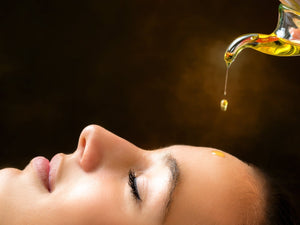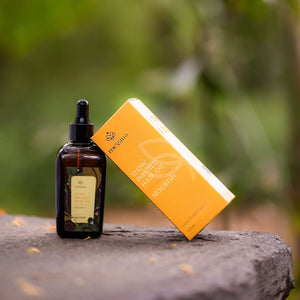Picture this: a Monday morning, your alarm buzzing relentlessly, but the only drumbeat you hear is the pounding in your belly. You are expected to get up and get on with your day, but your body is in rebellion mode. This day isn't just another day of the month; it's the first day of your cycle filled with all that discomfort, throbbing cramps, and emotional whirlwinds hidden behind a veneer of normalcy.
Even though not surprising, 80% of all menstruating women go through this ordeal at least once in their lives! But is menstruation meant to be this debilitating and painful? Ayurveda differs in belief! Ayurveda sees menstruation as a natural detoxifying process for women. Ideally, your periods should be painless and cramp-free without impacting your work or productivity.
So, how do you seek true menstrual well-being in a lifestyle flooded with menstrual disturbances and discomfort? Let's try to understand it from the Ayurvedic lens.
Brief overview of menstrual issues
Before we dive into the solutions, let's cast a compassionate gaze at the spectrum of menstrual issues that debilitate the lives of so many women who experience periods.
Menstrual Cramps:
These painful cramps, scientifically known as dysmenorrhea, are chief trouble during monthlies. These cramps are caused by the contraction of the uterus to shed its lining, leading to pain and discomfort that goes from mild to extreme in no time. While mild cramps are normal, if the pain becomes unbearable and begins to affect your daily life, this is where it becomes problematic.
Heavy Menstrual Flow:
Another common difficulty is managing a heavy flow. It is not just the constant worry of staining the clothes and soiling the sheets that keeps most women on their toes but also the fatigue, weakness, and restlessness associated with it. It is distressing and debilitating, with an endless fear of the clock ticking toward the next pad change.
Irregular Menstrual Cycles:
Let's not forget the elusive regularity of menstrual cycles, which poses a different set of challenges. This unpredictability can be emotionally taxing at times.
Premenstrual Syndrome (PMS):
The days leading up to menstruation bring with them a very physically and emotionally taxing behavioral phenomenon called premenstrual syndrome (PMS). This encloses a range of symptoms, from anger and irritability to bloating, headache, breast tenderness, mood swings, depression, and anxiety.

source: apollo 247
Ayurvedic perspective on menstrual health
Ayurveda classifies menstrual disorders under the umbrella terms of Artava Vyapad and Yoni Vyapad, meaning the disorders of the female reproductive tract. Vata, or a combination of Vata and Kapha, is responsible for their manifestation.
Ayurveda believes that the root of these disorders lies in everyday lifestyle mistakes, such as -
- Stress
- Indigestion
- Grief and anger
- Physical exertion
- Daytime sleeping
- Excessive alcohol consumption.
- Excessive indulgence in sexual activity
- Increased consumption of sour, salty, hot, spicy, heavy-to-digest, or fermented foods.
While mostly Vata and Vata or Kapha lead to these issues, symptoms may vary in case of ensuing imbalance.
Vata:
- Dark, scanty, and painful bleeding
- Often accompanied by anxiety and fatigue
Pitta:
- Clotting
- Heavy bleeding
- Burning sensation
- Extreme Irritability
Kapha:
- Mucousy discharge
- Prolonged and heavy bleeding
- Associated with depression and sadness
Ayurvedic solutions for menstrual well-being
Menstrual cramps:
- Vatas: Ginger tea with a pinch of cinnamon and licorice.
- Pittas: Fennel and coriander tea with a dash of turmeric.
- Kaphas: Ginger and cardamom tea with a hint of cinnamon.
Delayed periods:
- Vatas: Soak 1-2 teaspoons of fenugreek seeds in water overnight and consume the soaked seeds on an empty stomach in the morning.
- Pittas: In the morning, take 15-20 ml of Aloe juice mixed with equal water on an empty stomach.
- Kaphas: Take 1-2 grams of Triphala powder with warm water at bedtime.
Irregular cycle:
- Vatas: Consume a small handful (around 10-15 grams) of black sesame seeds with jaggery daily, preferably in the morning.
- Pittas: Consume 1-2 teaspoons of Shatavari Ghrita with warm milk once a day.
- Kaphas: Add a few strands of saffron to warm milk and consume it daily before bed.
PMS:
- Vatas: Mix 1/2 teaspoon of Ashwagandha powder into warm milk and consume it to help calm yourself.
- Pittas: Steep fresh mint leaves and fennel seeds in hot water and let them cool. Drink this refreshing tea throughout the day to balance your mood.
- Kaphas: Make ginger tea by steeping fresh ginger slices in hot water for 5-10 minutes. Drink it two to three times a day, especially during times of lethargy or heaviness.
Dietary Tips:
- Stay well-hydrated.
- Limit or avoid caffeine.
- Stick to regular meal times.
- Consume a well-balanced diet.
- Limit the intake of sour, spicy, and salty foods.
- Favor warm, cooked foods over cold or raw foods, especially during periods.
Lifestyle Tips:
- Establish a daily routine.
- Practice stress management.
- Ensure you get sufficient rest.
- Spend time in nature when possible.
- Avoid excessive physical and mental exertion.
- Practice mindful eating with minimal distractions.
- Engage in gentle yoga practices suitable for your body type.







